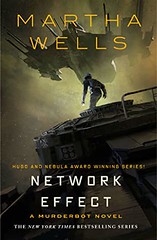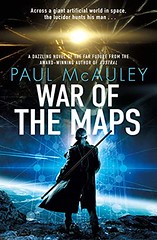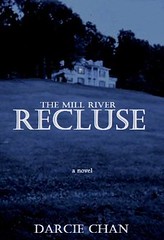“People lie, the president lies, corporations lie and cheat.…The world is ugly and not many people are willing to stand up to it anymore.”
— Michael Connelly, Two Kinds of Truth
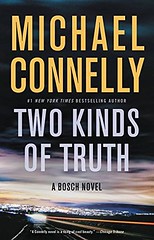 Two Kinds of Truth (Harry Bosch #20)
Two Kinds of Truth (Harry Bosch #20)
by Michael Connelly![]()
I’m sporadically reading Michael Connelly’s Harry Bosch novels (and the more recent Harry Bosch/Renee Ballard novels. I also watch the streaming Bosch series on Amazon Prime. When the TV series began to run a few years ago I picked up a copy of “The Black Echo,” the original Bosch novel, published in 1992. Here’s part of what I said then:
The TV Bosch is surprisingly faithful to Michael Connelly’s literary Bosch. My mental picture of Harry Bosch resembles the actor who plays him on TV. The personalities match. The stories, if I’m not assuming too much from the first novel in the series, generally match. [ … ] These are police procedurals, and though the crimes are complex, Connelly doesn’t make their resolution tricky … Bosch unfolds cases methodically, using old-fashioned shoe leather and diligent detective work, and if there are twists, the reader can see them coming a block or two away. [ … ] In this first novel, Bosch comes across as a bit of a cold fish, a little less sympathetic than his TV counterpart, but I’m assuming his character grows in later novels.
I read “Two Kinds of Truth,” the 20th Harry Bosch novel, out of sequence because, to my surprise, the ebook was available for withdrawal online from my library, otherwise closed for the pandemic. Previously I’d read the 1st and 2nd novels in the series, plus the 1st, 2nd, and 3rd Bosch/Ballard novels, which chronologically (if chronology means much in Connelly’s Bosch universe) occur sometime after the story told in this novel.
The plot of “Two Kinds of Truth” survived almost intact as season #5 of the Bosch TV series on Amazon Prime. Of course one learns many details left out to fit a compressed TV storyline. I was surprised to learn, for example, that Bosch harbored doubts about his former partner J. Edgar, something I never picked up on in the TV version. There is much much more, but I’ll stop with the spoilers.
As I noted in a previous review, Connelly avoids the use of contractions in dialog, and this makes the book version of Bosch seem a bit cold. Well, Bosch is a loner, often at odds with the world, so maybe the thing with the lack of contractions is intentional on Connelly’s part. It does not really detract from enjoying the books, save for the occasional thought that real people don’t speak as formally as the characters in these novels. Connelly is a great storyteller, but an Elmore Leonard or George V. Higgins he is not.
This is a tight story with a lot of suspense and action in the right places. Question for other Bosch fans: is there any sex in these novels? I don’t really miss or need it, and didn’t notice its absence when reading the novel, but it hits me now as somewhat odd, given all the women characters Bosch works with and encounters. Something else to look out for when I read other Bosch novels.
“’You’re not Dostoevsky,’ said the citizeness, who was getting muddled by Koroviev.
‘Well, who knows, who knows,’ he replied.
‘Dostoevsky’s dead,’ said the citizeness, but somehow not very confidently.
‘I protest!’ Behemoth exclaimed hotly. ‘Dostoevsky is immortal!’”
— Mikhail Bulgakov, The Master and Margarita
The Master and Margarita
by Mikhail Bulgakov![]()
This was my book club’s selection for December 2020.
Another reviewer says this:
The novel’s vision of Soviet life in the 1930s is so ferociously accurate that it could not be published during its author’s lifetime and appeared only in a censored edition in the 1960s. Its truths are so enduring that its language has become part of the common Russian speech.
True enough that Bulgakov’s novel couldn’t be published in his lifetime, then only in censored form when finally printed in 1960. But I’m befuddled by the reviewer’s “ferociously accurate” comment, because as an American child of the Cold War, I was raised to believe Soviet life in the 1930s was infinitely worse than the life depicted in “The Master and Margarita,” more akin to Orwell’s “1984” than this comic romp through the bourgeois lives of middle- and upper-class Muskovites.
They had nomenklatura under Stalin in the 1930s? Who took cabs to the theatre and restaurants? Who lusted after French fashion? Who were petty and motivated by greed, like anyone anywhere? Who didn’t live in constant fear of informers and secret police? Who didn’t fear a knock on the door in the middle of the night? Who knew?
Oh, yes, some vague hints of Soviet grimness are here. There are plenty of police, though not of the Chekist variety. The state seems very concerned with what its citizens may be up to, particularly the hoarding of foreign currency. Atheism is the approved religion, yet poets and writers aren’t fearful of openly discussing religious subjects. But all in all, the lives of the Master and Margarita are recognizable to Westerners.
Notably not present in Bulgakov’s masterpiece: the lives of Soviet citizens outside Moscow. Where are the communes? The peasants? The widespread privation and starvation?
I’m not saying I didn’t love “The Master and Margarita.” I couldn’t put it down. It’s a comic masterpiece. But I think some readers make too much of three words spoken by Satan and his comrades: “manuscripts don’t burn.” This is no “Fahrenheit 451.” This is no “One Day in the Life of Ivan Denisovich.” I don’t think Bulgakov’s intent was to write a subversive novel with secret meanings to be teased out between the lines. I think “The Master and Margarita” is just what it appears to be: Bulgakov having fun retelling the stories of Faust and Pontius Pilate.
“Ugh, emotions.”
— Martha Wells, Network Effect
Network Effect (The Murderbot Diaries, #5)
by Martha Wells![]()
From my review of “All Systems Red (Murderbot Diaries #1)”:
I was delighted with this introduction to the Murderbot. I generally don’t expect much of novellas, but this one is meaty and fulfilling. There’s a lot of gee whiz science fiction here, on an alien planet no less, along with interesting world-building about future human societies, but true to the series title, “The Murderbot Diaries,” it’s told on a chatty, personal level by the very human Murderbot itself, and though it would wince at my praise, Murderbot is a first-rate story-teller. Based on this first read, I expect the overall Murderbot series to be a great, fun experience.
“Network Effect” is the first novel-length Murderbot story in the series, and the best I’ve read to date. I’ll note that I’m reading the series in order and recommending other readers do the same, because each new novella (or novel, in this case) contains multiple references to events, encounters, and lessons learned in previous installments.
Everything about the story in “Network Effect” justifies it being a full-length novel. Readers who’ve grown fond of the Murderbot will enjoy its continued personal growth as it goes on a mission with members of its extended human family from the Preservation alliance and meets (or is abducted by) other old friends and associates along the way. Although “family” and “friends” are words Murderbot itself would never use.
“Growing” is key to my enjoyment of this series. I loved Lee Childs’ Jack Reacher series as well. Read every one of them in order, just as I’m doing with Murderbot. No one can say Jack Reacher grows. Murderbot is constantly evolving and is full of surprises.
I wondered if Martha Wells talked to military aviators … fighter pilots in particular … as background research for this novel. We too classify newly acquired entities as “contacts” and “targets,” usually instantly. I feel closer to Murderbot with each new installment.
The closing chapter of “Network Effect” sets the stage for some great sequels, and it’s all I can do to pace myself and read the other books waiting on my shelf and my Kindle. I’ll be back, and soon.
“We shouldn’t automatically oppose everything. I mean, what makes us so fucking smart? We’re the beneficiaries of people before us figuring out shit that makes our lives better or helps us live longer. Why stop now, just because we think we know it all?”
— C.J. Box, Free Fire
Free Fire (Joe Pickett #7)
by C.J. Box![]()
I’m reading C.J. Box’s Joe Pickett novels, which are set in a mountainous, sparsely-populated corner of Wyoming and feature a fish & game warden who finds himself and his family threatened by bad men intent on raping the West. They’re great reads, engrossing and impossible to put down, and I’m devouring the series.
It’s difficult to write meaningful reviews of individual novels in a series. Unless I have something urgent to say about individual Joe Pickett novels, I’ll repeat what I said about “Open Season,” the first novel in the series:
As much as I enjoy reading Lee Childs’ Jack Reacher stories, Jack is a superhero, a figure of fantasy. When Jack Reacher gets even, people die … but not before a righteous ass-kicking. While C.J. Box brings on Reacheresque tension and villainy, when it comes to his human and relatable hero Joe Pickett, it’s more a matter of luck. Joe prevails, a believable form of getting even. But don’t worry. Asses do get kicked, in satisfying ways. I really like this Pickett guy. He makes mistakes, and plenty of them. He worries about money. He trusts people he shouldn’t. He’s a regular Joe. I really like the depictions of Wyoming, a state I lived in as a teenager and remember fondly. Joe, at least in this first novel, has an almost-too-perfect family, but there are tensions, and I sense troubled teenage years ahead for his daughter Sheridan. Granted that everything in this novel is fiction, it feels real and true.
“Free Fire,” the 7th installment of the Joe Pickett series, is the most educational of the novels so far, and I don’t say that to drive potential readers away. The action takes place inside Yellowstone National Park, with Joe, reinstated as a Wyoming game warden, working as an unwelcome intruder on federal land, tasked by the governor to investigate a mass murder that eventually reveals corruption at high levels and puts his own life and that of his family in jeopardy. Great action, a fascinating plot based in reality, and a tremendous hook at the end involving Joe’s unofficial, undercover, off-the-books, gunslinging sidekick Nate Romanowski. Which is to say once you’ve read the 7th Joe Pickett novel, you have to read the 8th. If it’s half as good as this one, it’ll be another gripping read.
As an aside, I published my review of the 6th Joe Pickett novel on Daily Kos, where it drew this comment:
I had to stop reading C.J.Box a couple of books back. I liked Joe Pickett well enough but as a Canadian & a gun control activist (& someone who was born & raised in Alberta ranch country), I find Box’s glorification of guns & violence as the answer to everything that’s wrong in your world & “the cowboy way” (which seems to mean a lot of revenge porn & strident red, white & blue jingoism masquerading as patriotic heroism) pretty hard to take.
To which I respond: “Well, duh!”
“’Lucidor’ means ‘one who seeks light’. Light being knowledge, wisdom, understanding. But you don’t seek it out because you want to understand it, do you?”
— Paul McAuley, War of the Maps
War of the Maps
by Paul McAuley![]()
I was impressed with Paul McAuley’s world building and character development, the former in particular driving me to keep turning pages. My only disappointment came at the very end, when a previously minor character delivered a John Galt-style speech that went on for several pages. Looking back, there were forecasts of a such a message sprinkled through the book, as the lucidor compared the social, political, and economic organization of his home “map,” the Free State, to that of the map of Padua, but I was surprised to find the book ending with a manifesto.
I wanted more world building, more exploration of distant maps and the people who inhabited them, and more contact with shatterlings, which I assume are artificial intelligences, still somehow functioning in isolation hundreds or perhaps thousands of years after their makers abandoned this strange world. Toward the end, I was reminded of Jeff VanderMeer’s Southern Reach trilogy, and I do mean that as a compliment.
I hope McAuley hasn’t finished exploring this world. If he writes a sequel, my distaste for manifestos aside, I will read it.
“She knew the names and ages of most of the townspeople, what they did for a living, whether they were children or had children, when they were ill or doing well.”
— Darcy Chan, The Mill River Recluse
The Mill River Recluse (Mill River #1)
by Darcie Chan![]()
I remember being offered a free copy of “The Mill River Recluse” several years ago. The blurb must have been a good one, because I bit and downloaded a copy. I didn’t get around to reading it until this week. If I offered a review in exchange for the free copy, I apologize for taking so long. But you won’t like my review, so maybe it’s just as well.
I read it to the end, hoping in vain for a surprise twist, or at least some plot development based on what small towns and small town people are actually like, but Darcie Chan stayed in the Hallmark Channel groove from the first page to the last, telling a simple story several times from different points of view. All but two comically-bad characters are sweet and good. The promised reveal (the twist I was hoping for) is a now-it-can-be-told speech to be delivered at a Vermont town hall meeting. The buildup is a long one, but when we finally get to it, it’s a long and windy John Galt-style speech, that is if you can picture John Galt as Ellen deGeneres, handing out free stuff to a studio audience.
Wouldn’t it be nice if everyone was nice and lived in nice little towns with nice wealthy widows to give them stuff? Niceness sells, and Darcie Chan has done very well with this story. More power to her.
“… macroeconomics was no longer so very clear on the ultimate effects of quantitative easing, given that the evidence from the past half century could be interpreted either way. That this debate was a clear sign that macroeconomics as a field was ideological to the point of astrology was often asserted by people in all the other social sciences, but economists were still very skilled at ignoring outside criticisms of their field, and now they forged on contradicting themselves as confidently as ever.”
— Kim Stanley Robinson, The Ministry for the Future
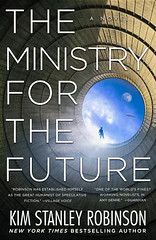 The Ministry for the Future
The Ministry for the Future
by Kim Stanley Robinson![]()
Did not finish; no rating.
I made it to the halfway point, but only by skipping academic third-person infodump chapters about blockchain and macroeconomics (which chapters seemed, as the novel progressed, to get longer), reference the quote above. What’s that they say about showing, not telling?
“The Ministry of the Future” is hopelessly, geekily earnest, more manifesto than novel, and if I read informed reviewers’ comments correctly, full of half-baked ideas at conflict with science, human nature, history, and likely socioeconomic trends.

